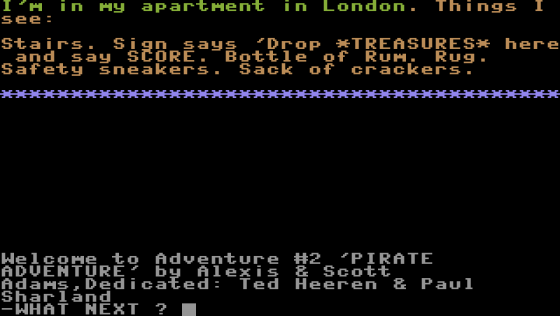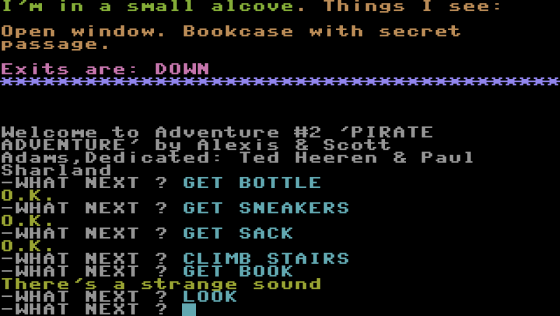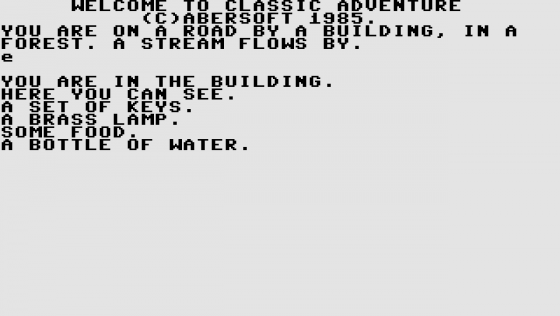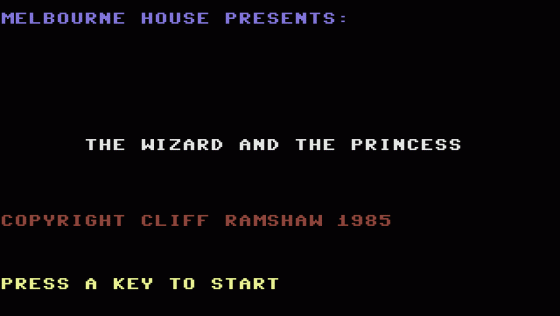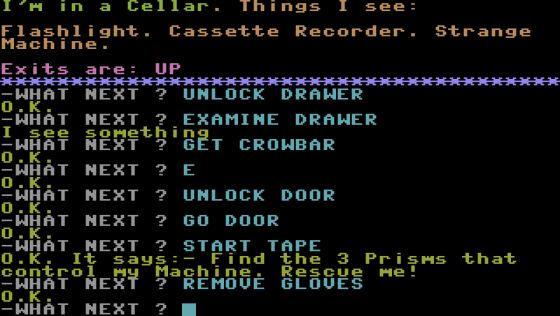
Commodore User
 1st August 1985
1st August 1985
So you thought the C16's measly memory counts it out as a machine for adventurers? Not so. We've rounded up the best of the C16 adventure crop, for both the beginner and the experienced puzzle 'n peril buster.
C16 Adventure Special
How do you pack the Hall of Mists, Elvenking's dungeon and the gremlinesque Kingston Falls into your Commodore 16's modest memory? Easy! Just put the program onto a plug-in cartridge, or put the genius of Brian Howarth of John Jones-Steele to work on refining text compression techniques to the point where (albeit at the expense of pretty graphics) it really is possible to cram a credible version of Classic Adventure or Gremlins into your C16 (or, come to that, Plus/4).
Scott Adams Classics (U. S. Gold)
One is almost duty bound to begin this round-up of C16 adventures currently on offer with a look at the creations of the ubiquitous Scott Adams who, almost single-handedly, proved that there was intelligent life after Space Invaders.
But it's sad that Adams' earlier works - at least in the text-only versions now out on C16 cartridges from Commodore, price £11.99 each - are beginning to show their age.
With such lacklustre software support for the C16 (possibly the most underrated low-price micro of all time in my book), perhaps one is simply meant to be grateful that Commodore even bothers to market this modest trio - but these implementations of Pirate Adventure, Atomic Mission and Strange Odyssey lean a little too heavily on the Adams' name (Pirate Adventure was actually written by Scott's wife Alexis) for their appeal.
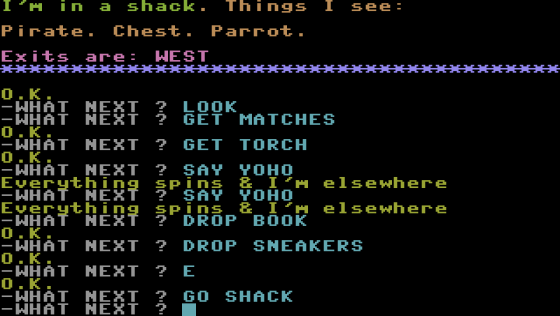
In none of them has any attempt been made to add a vestige of visual appeal to the oh-so-basic screens by making even a little imaginative use of the C16's excellent colour and sound facilities. No scene-setting title page, no mini-theme to heighten the atmosphere, not even a stab at setting out the text in an interesting way. Staring at the average sauce-bottle label might prove more stimulating.
That said, the entertainment to be had from almost any Adams title is still to be found below their uninviting surface, even if it has proved beyond the authors' capabilities to add a few good looks.
That whinge apart, Pirate Adventure in particular makes a good choice for the novice adventurer, comprising as it does fewer than 30 locations but a great many more knuckle-whitening puzzles: beginners will soon find themselves wrestling with the magical rum, the classical anchor problem (The parrot may have good tidings) and those snappy crocodiles on their way to discovering the treasure that's the reward for solving some gloriously perverse arcanums.
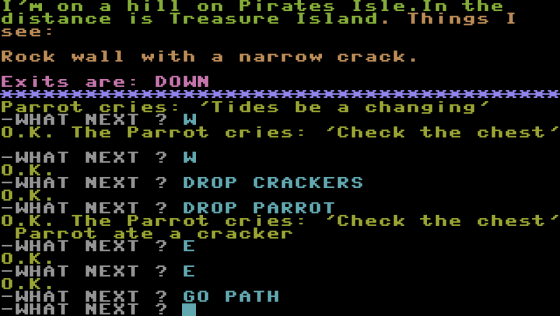
A couple or rungs up the ladder of difficulty, Strange Odyssey will have you backpacking around a strangely sterile planet (rumour has it, the prototype for Milton Keynes) in a quest to find several items to help achieve your understandable ambition to escape. But you'll soon discover a snag-ridden jungle, an ambivalent ice hound and a rewarding museum and many other elements to keep you guessing.
Atomic Mission has more or less the same level of difficulty. The challenge is to save the world's first automated nuclear reaction from destruction - and wonder why it was built in the first place.
All three adventures come with a very clearly explained and illustrated playing guide to get the new adventurer on the road. But in terms of presentation, they're way behind the times (inputs are limited to verb-noun, and even then the logic has some irritating blind spots) but the convenience appeal of instant play cartridges can't be denied.
Classic Adventure (Melbourne House)
There can be few adventurers who don't occasionally pay silent homage to Crowther and Woods, the Americans who in 1975 developed the world's very first computer adventure, which in turn borrowed heavily from Dungeons and Dragons, the role-playing board game that had made its debut a year earlier.
Of the numerous versions which C&W's Adventure spawned, two only are generally recognised by the cogniscenti as being wholly worthy interpretations of the original.
One is Pete Austin's version for Level 9, Colossal Adventure, and the other is John Jones-Steele's reworking for Melbourne House under the title Classic Adventure - of which a version for the C16 has, happily, just been released at £5.95.
The player first finds himself on a winding road near a stream, but soon a hut comes into view, where a lamp, keys and refreshment await. And you'll need them all to outwit the axe-throwing dwarves, the covetous pirate and the avaricious troll in your bid to collect the precious gems and many other hidden and guarded treasures that await your detection.
Direction commands can be entered as a single letter, and the input parser works on only the first four letters of the verbs/nouns you enter. This can occasionally have unnerving results; typing REST, for example, triggers the response "Press play on tape" because your input has been mistaken as an instruction to restore a saved game. Get out of this by hitting Run Stop. There's a score and help feature.
Crisp, logical, often maddening but always entertaining, Classic Adventure is one of the best and cheapest of the crop for the C16.
The Wizard And The Princess (Melbourne House)
Also from Melbourne House at £5.95 comes The Wizard And The Princess. This Clifford Ramshaw title will be fondly remembered by Vic Pioneers because it was for yonks the only thing close to a decent arcade adventure available for that micro, which wondrous feat was accomplished by loading it in separate parts. The new, and much improved, C16 version also uses this trick.
There are five levels which autoload in the correct sequence as you successfully complete each part of your quest - or you may choose instead to load them in any order you choose.
The challenges include a mini graphic adventure, a couple of simple arcaders and 3D-style maze game. Find the wizard's castle, defeat the guardian dragons, negotiate the labyrinthine passages and rescue the princess - and the rest of the day's your own.
The whole shebang can be listed so when you've exhausted its play value you have an opportunity to pick up some programming knowhow.
Mysterious Adventures
How come that one-man adventure factory Brian Howarth finds enough hours in the day to produce all those titles for Adventure International and write C16 versions of four of his most popular Mysterious Adventures? The simple answer is that when Brian was converting a number of C64 titles for the Vic, Channel 8 Software, his original publishers, hit trading difficulties last year. By the time all that sorted itself out, and Adventure International bought out Channel 8, the C16 was in the shops - and AI shrewdly invited their new star author to tweak his conversions for the C16.
So how good is the quartet of text adventures that is the result? In Ten Little Indians, your adventures begin on a train to the country mansion of a fabulously wealthy eccentric who literally poured all his money into a gold figurine just before his death. The key to its discovery is in the ten worthless figurines you must first collect - while guarding your own life, possibly from the major's jealous nephew.

Ray Bradbury fans who enjoyed reading Something Wicked This Way Comes (crafted into an excellent film by Walt Disney) may recognise the scenario of a surrealist funfair used in Circus, where everything is what it's not and nothing is what it seems. Serves you right for running out of petrol on a deserted country road.
There's a science fiction flavour also to Escape From Pulsar Seven, where you take on the role of a stellar trader who makes the mistake of freighting a strange creature from an intergalactic zoo, which soon starts growing faster than Philip Mitchell's bank balance.
Back to some Orwellian fun with The Time Machine, where gossip about strange lights and weird noises coming from the home of a whirly scientist - not to mention the figure in full armour seen wandering in the grounds - set you off on a quizzical quest in which time warps whip you through more centuries than Freddie Truman.
All four titles rely on a fundamental verb/noun parser, but the accepted vocabulary is more imaginative than most and help, score, save and inventory commands move things along.
Microdeal Adventures
Cheapest among C16 titles are Williamsburg Adventure and Mansion Adventure from Microdeal, both priced at £3.99. I gave up trying to load my copy of Mansion after the sixth or seventh attempt but Williamsburg burst into life quite happily, eventually, and I found myself in a small mid-West colonial town trying to track down a golden horseshoe while dodging the hazards of evil spirits, ghosts, a murderous butcher and a terminal maze.
Input is simply a verb/noun affair and you're given occasional bits of Help. Instructions are virtually non-existent.
One problem: I can't figure out a way of saving a game; one star deducted for that.
In Conclusion
Finally, Trevor Hall is rumoured to be preparing a special C16 text-only version of his classic Twin Kingdom Valley. Might Melbourne House follow suit with The Hobbit? After all, Tolkien's version was text only too!
Scores
(Commodore 16/Plus 4)
(Commodore 16)
(Commodore 16/Plus 4)
(Commodore 16/Plus 4)
(Commodore 16)
(Commodore 16)
(Commodore 16/Plus 4)
(Commodore 16/Plus 4)
(Commodore 16/Plus 4)
(Commodore 16)

